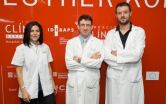(Press-News.org) Research which claims to show that the introduction of patient choice in the NHS reduced deaths from heart attacks is flawed and misleading, according to a report* published in The Lancet today (Monday).
The original study was used by the Government to advance its controversial Health and Social Care Bill 2011 and was the basis for the Prime Minister's statement that 'competition is one way we can make things work better for patients'.
In today's report, academics - led by Professor Allyson Pollock of Queen Mary, University of London - point out a series of errors in the study and conclude that it is 'fundamentally flawed'.
The research David Cameron referred to was a paper by Zack Cooper and colleagues which was published by LSE Health. It examined the mortality rates for heart attack patients measured against the number of hospitals within travelling distance of the patient's GP surgery. It also looked at data on elective surgery for hernia, cataract repair, knee arthroscopy, hip replacement and knee replacement, and claims to show that introducing greater choice in elective surgery led to lower death rates from heart attacks.
Professor Pollock and her colleagues - including Professor Alison Macfarlane at City University London - say that, crucially, the study offers no explanation as to why the availability of choice for such elective procedures should have any effect on whether heart attack patients survive.
The Lancet report also points out the following:
the researchers do not look at whether the availability of choice has any effect on where patients go for treatment,
they do not look at whether or how GPs' patterns of referrals changed when choice became available,
recent research indicates the majority of patients who have been offered a choice pick their nearest hospital,
heart attack is a medical emergency and patients generally have no choice about where they are treated,
outcomes for heart attack patients tend to be better when they are treated in specialist centres in urban areas,
the authors ignore the possible effects of major changes in primary care prevention and secondary care intervention for heart attacks,
and that there is no evidence that the data on elective operations is in any way a good measure of choice or competition.
Professor Pollock said: "The Government's Health Bill has faced enormous opposition from the public and from health professionals. In trying to win over his critics the Prime Minister has used the study by Zack Cooper to justify competition within the National Health Service.
"Our examination of this research reveals it to be fundamentally flawed, amounting to the conclusion that the paper simply doesn't prove either cause or effect between patient choice and death rates.
"This work should not be quoted as scientific evidence to support choice, competition or the new Health and Social Care Bill."
###
Note to editors
* 'Statistical association is not causation: Claims that patient choice and market competition in the NHS reduce AMI mortality are misleading and false', Pollock, A, et al, Lancet Online First publication, 10 October 2011
Queen Mary, University of London is one of the UK's leading research-focused higher education institutions with some 16,000 undergraduate and postgraduate students. Amongst the largest of the colleges of the University of London, Queen Mary's 3,000 staff deliver world-class degree programmes and research across three faculties: Science and Engineering; Humanities and Social Sciences and the School of Medicine and Dentistry.
One of the rising stars in UK higher education, Queen Mary was ranked 11th nationally in the last Research Assessment Exercise, and was rated as one of the world's elite universities in the 2010 Times Higher Education's Top 200 World University Rankings (120th place).
The College has a strong international reputation with around 23 per cent of students coming from over 130 countries. Queen Mary has an annual turnover of £300m, research income worth £70m, and a yearly impact on the UK economy of over £750m.
Queen Mary, as a member of the 1994 Group of research-focused universities, has made a strategic commitment to the highest quality of research, but also to the best possible educational, cultural and social experience for its students. The College is unique among London's universities in being able to offer a completely integrated residential campus, with a 2,000-bed award-winning Student Village on its Mile End campus.
City University London is an international University with a commitment to academic excellence, a focus on business and the professions and a central London location. It is placed in the top 5% of universities around the world by the Times Higher Education World University Rankings 2010-11 and is ranked in the top 30 UK higher education institutions by the Times Higher Education Tables of Tables 2011.
The University's Student Centre holds the 2011 Times Higher Education Leadership & Management Award for Outstanding Student Services Team.
City is a broadly-based University with world leading strengths in business; law; engineering and mathematical sciences; informatics; health sciences and the arts including journalism and music.
The University attracts over 21,000 students from more than 160 countries and academic and professional staff from over 50 countries.
City University London's predecessor, the Northampton Institute, was founded in 1894. City will celebrate its first half century as a University in 2016.
www.city.ac.uk
END
Rodriguez MD, a Lawrenceville clinic and bilingual Lawrenceville family practice in Gwinnett County, GA, opened an onsite Center for Medical Weight Loss on Monday October 3, 2011. Striving to help patients safely and effectively lose weight, Rodriguez MD now offers comprehensive, personalized weight loss programs. This includes:
- Body composition analysis
- Doctor-supervised food plans
- Metabolism regulation
- Appetite management
- Lifestyle and motivational coaching
- Science-based activity recommendations
Medical weight loss is physician-directed weight ...
For some people, the glass is always half full. Even when a football fan's team has lost ten matches in a row, he might still be convinced his team can reverse its run of bad luck. So why, in the face of clear evidence to suggest to the contrary, do some people remain so optimistic about the future?
In a study published today in Nature Neuroscience, researchers at the Wellcome Trust Centre for Neuroimaging at UCL (University College London) show that people who are very optimistic about the outcome of events tend to learn only from information that reinforces their rose-tinted ...
Could controlling cell-membrane fat play a key role in turning off disease?
Researchers at the University of Illinois at Chicago think so, and a biosensor they've created that measures membrane lipid levels may open up new pathways to disease treatment.
Wonhwa Cho, distinguished professor of chemistry, and his coworkers engineered a way to modify proteins to fluoresce and act as sensors for lipid levels.
Their findings are reported in Nature Chemistry, online on Oct. 9.
"Lipid molecules on cell membranes can act as switches that turn on or off protein-protein interactions ...
Often, in this economy, it is easy to get behind. You know you owe taxes to the IRS, but every day bills and financial obligations begin to take priority in order to maintain a reasonable standard of living.
This is the situation Michael (Tecumseh, Kansas) found himself in when he called the offices of Blue Tax in desperation looking for some guidance on how to get the IRS to cease sending him threatening letters about levies and garnishments, knowing that he owed back taxes.
Michael's goal in retaining Blue Tax's services was to protect him from possible collection ...
Massachusetts General Hospital (MGH) researchers – along with collaborators from Massachusetts Institute of Technology (MIT) and Alnylam Pharmaceuticals – have found a way to block, in an animal model, the damaging inflammation that contributes to many disease conditions. In their report receiving early online publication in Nature Biotechnology, the investigators describe using small interfering RNA technology to silence the biochemical signals that attract a particular group of inflammatory cells to areas of tissue damage.
"The white blood cells known as monocytes ...
One of the most successful strategies in pest control is to endow crop plants with genes from the bacterium Bacillus thuringiensis, or Bt for short, which code for proteins that kill pests attempting to eat them.
But insect pests are evolving resistance to Bt toxins, which threatens the continued success of this approach. In the current issue of Nature Biotechnology, a research team led by UA Professor Bruce Tabashnik reports the discovery that a small modification of the toxins' structure overcomes the defenses of some major pests that are resistant to the natural, ...
Aircraft Management Group, Inc., branded as AMG Jets, is pleased to announce the expansion of its team to include two new members. These members include Shannon Pennypacker, appointed as Director of Marketing and Sales; and Lynne Cone, appointed as a private aviation specialist.
This expansion is in response to the increasing demand level and sales growth last year. "We have experienced consistent growth year after year," said President John Sieckowski. "The increase in our team will help us to keep up with the growing demand of our wide range of services."
Shannon ...
An international team of researchers has discovered the first DNA faults linked to melanoma - the deadliest skin cancer - that are not related to hair, skin or eye colour.
Cancer Research UK scientists at the University of Leeds, together with a team from the GenoMEL consortium*, scanned the genes in blood samples from almost 3000 Europeans with melanoma, and compared these with samples taken from the general population.
Their findings are published in Nature Genetics today.**
Known risk factors for melanoma include fair skin, blue or green eyes, blond or red hair, ...
The world's thinnest, strongest and most conductive material, discovered in 2004 at the University of Manchester by Professor Andre Geim and Professor Kostya Novoselov, has the potential to revolutionize material science.
Demonstrating the remarkable properties of graphene won the two scientists the Nobel Prize for Physics last year and Chancellor of the Exchequer George Osborne has just announced plans for a £50m graphene research hub to be set up.
Now, writing in the journal Nature Physics, the University of Manchester team have for the first time demonstrated how graphene ...
The genomic analysis technologies enable the study of genetic factors related to numerous diseases. In few areas this researches brought such a big and useful volume of information as in the case of melanoma. A study published in Nature Genetics, promoted by the GenoMEL consortium, consolidates the results obtained in previous whole-genome analysis and identifies three new chromosomal regions implicated in susceptibility to melanoma. The GenoMEL consortium is funded by the European Commission and the National Institutes of Health (USA) to increase the understanding of genetic ...


